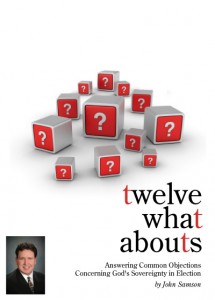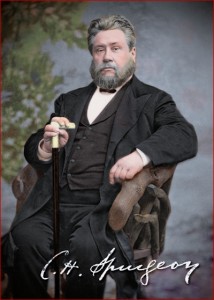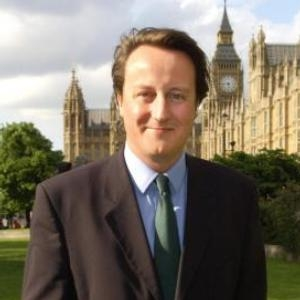 With my new book “Twelve What Abouts – Answering Common Objections Concerning God’s Sovereignty in Election” due to be published in early January, 2012, I thought it would be helpful to provide something of a window as to my purpose in writing it. Here’s an introductory chapter entitled “A Word to the Reader”:
With my new book “Twelve What Abouts – Answering Common Objections Concerning God’s Sovereignty in Election” due to be published in early January, 2012, I thought it would be helpful to provide something of a window as to my purpose in writing it. Here’s an introductory chapter entitled “A Word to the Reader”:
Question: WHY THIS BOOK?
Answer: For the glory of God
Question: WHO IS THIS BOOK WRITTEN FOR?
Answer: Christians who believe the Bible is the word of God and who wish to gain a biblical understanding of God’s electing grace in Christ.
Question: WHO WILL GAIN MOST FROM THE BOOK?
Answer: Those who are willing to test and examine their traditions and hold them up to the light of Scripture, the sole infallible rule of faith for the people of God.
This is not an easy process at times, more for emotional rather than intellectual reasons. Many of us have been told things by highly respected people in our lives (such as the person who led us to Christ, or a revered pastor or Bible teacher, or a father or mother in the faith) which, upon analysis, may not in fact be true. Sometimes, to actually test such statements can feel like an act of betrayal on our part. Yet, it is vital for all who desire to be led by the Spirit of truth to yield to His leading rather than maintain an emotional allegiance to what many call “theological love lines.”

 THE PRINCE OF PREACHERS – Charles Haddon Spurgeon (1834-92) was England’s best-known preacher for most of the second half of the nineteenth century. In 1854, just four years after his conversion, then only 20, became pastor of London’s famed New Park Street Church (formerly pastored by the famous Baptist theologian John Gill). The congregation quickly outgrew their building, moved to Exeter Hall, then to Surrey Music Hall.
THE PRINCE OF PREACHERS – Charles Haddon Spurgeon (1834-92) was England’s best-known preacher for most of the second half of the nineteenth century. In 1854, just four years after his conversion, then only 20, became pastor of London’s famed New Park Street Church (formerly pastored by the famous Baptist theologian John Gill). The congregation quickly outgrew their building, moved to Exeter Hall, then to Surrey Music Hall. Late last week, the English Prime Minister gave a quite amazing speech honoring the 400th anniversary of the King James Bible. He said:
Late last week, the English Prime Minister gave a quite amazing speech honoring the 400th anniversary of the King James Bible. He said: